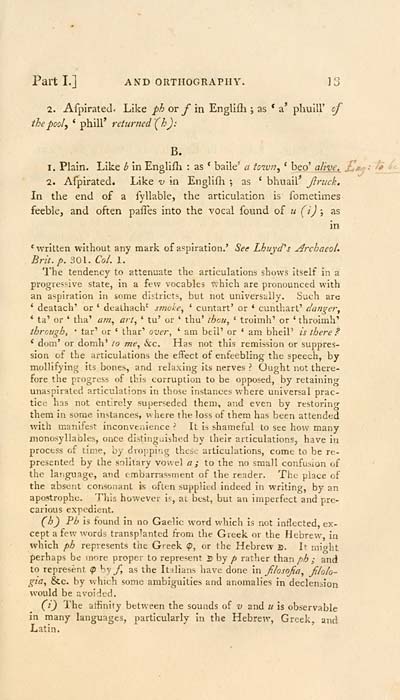Download files
Complete book:
Individual page:
Thumbnail gallery: Grid view | List view

Parti.] AND ORTHOGRAPHY. 13
2. Afplrated. Like ph or f in Englifli ; as * a' phuill' cf
the pool, * phill' returned (h):
B.
1. Plain. Like b in Englifli : as * baile' a town, ' beo' alive. ^ .
2. Afpirated. Like v in Englifli -, as * bhuail* Jlruck.
In the end of a Syllable, the articulation is fometimes
feeble, and often pafTes into the vocal found of u (i) ; as
* written without any mark of aspiration.' See Lhuyd''s Archaeot.
Brit. p. 301. Col. 1.
The tendency to attenuate the articulations shows itself in a
progressive state, in a few vocables which are pronounced with
an aspiration in some districts, but not universally. Such arc
* deatach' or ' deathach^ smohe^ ' cuntart' or * cunthart' danger^
* ta' or ' tha' am, art, ' tu' or ' thu' thou, ♦ troimh' or ' throimh'
through, • tar' or ' thar' over, ' am bell' or ' am bheil' is there P
* dom' or domh' to me, &c. Has not this remission or suppres-
sion of the articulations the effect of enfeebling the speech, by
mollifying its bones, and relaxing its nerves ? Ought not there-
fore the progress of this corruption to be opposed, by retaining
unaspirated articulations in those instances where universal prac-
tice has not entirely superseded them, and even by restorincp
them in some instances, v\ here the loss of them has been attended
with manifest inconvenience ? It is shameful to see how many
monosyllables, once distinguished by their articulations, have in
process of time, by dropping these articulations, come to be re-
presented by the solitary vowel a ; to the no small confusion of
the language, and embarrassment of the reader. The place of
the absent conso.iant is often supplied indeed in writing, by an
apostrophe. This however is, at best, but an imperfect and pre-
carious expedient.
C^J Ph is found in no Gaelic word which is not inflected, ex-
cept a few words transplanted from the Greek or the Hebrew, in
which ph represents the Greek <p, or the Hebrew s. It might
perhaps be more proper to represent *j by p rather than ph ; and
to represent (p hy f, as the Italians have done in Jilosojia, Ji/o/o-
gta, &c. by which some ambiguities and anomalies in declension
would be avoided.
(i) The atfinity between the sounds of v and u is observable
in many languages, particularly in the Hebrew, Greek, and
Latin.
2. Afplrated. Like ph or f in Englifli ; as * a' phuill' cf
the pool, * phill' returned (h):
B.
1. Plain. Like b in Englifli : as * baile' a town, ' beo' alive. ^ .
2. Afpirated. Like v in Englifli -, as * bhuail* Jlruck.
In the end of a Syllable, the articulation is fometimes
feeble, and often pafTes into the vocal found of u (i) ; as
* written without any mark of aspiration.' See Lhuyd''s Archaeot.
Brit. p. 301. Col. 1.
The tendency to attenuate the articulations shows itself in a
progressive state, in a few vocables which are pronounced with
an aspiration in some districts, but not universally. Such arc
* deatach' or ' deathach^ smohe^ ' cuntart' or * cunthart' danger^
* ta' or ' tha' am, art, ' tu' or ' thu' thou, ♦ troimh' or ' throimh'
through, • tar' or ' thar' over, ' am bell' or ' am bheil' is there P
* dom' or domh' to me, &c. Has not this remission or suppres-
sion of the articulations the effect of enfeebling the speech, by
mollifying its bones, and relaxing its nerves ? Ought not there-
fore the progress of this corruption to be opposed, by retaining
unaspirated articulations in those instances where universal prac-
tice has not entirely superseded them, and even by restorincp
them in some instances, v\ here the loss of them has been attended
with manifest inconvenience ? It is shameful to see how many
monosyllables, once distinguished by their articulations, have in
process of time, by dropping these articulations, come to be re-
presented by the solitary vowel a ; to the no small confusion of
the language, and embarrassment of the reader. The place of
the absent conso.iant is often supplied indeed in writing, by an
apostrophe. This however is, at best, but an imperfect and pre-
carious expedient.
C^J Ph is found in no Gaelic word which is not inflected, ex-
cept a few words transplanted from the Greek or the Hebrew, in
which ph represents the Greek <p, or the Hebrew s. It might
perhaps be more proper to represent *j by p rather than ph ; and
to represent (p hy f, as the Italians have done in Jilosojia, Ji/o/o-
gta, &c. by which some ambiguities and anomalies in declension
would be avoided.
(i) The atfinity between the sounds of v and u is observable
in many languages, particularly in the Hebrew, Greek, and
Latin.
Set display mode to: Large image | Transcription
Images and transcriptions on this page, including medium image downloads, may be used under the Creative Commons Attribution 4.0 International Licence unless otherwise stated. ![]()
| Early Gaelic Book Collections > Blair Collection > Elements of Gaelic grammar > (43) |
|---|
| Permanent URL | https://digital.nls.uk/79040491 |
|---|
| Description | A selection of books from a collection of more than 500 titles, mostly on religious and literary topics. Also includes some material dealing with other Celtic languages and societies. Collection created towards the end of the 19th century by Lady Evelyn Stewart Murray. |
|---|
| Description | Selected items from five 'Special and Named Printed Collections'. Includes books in Gaelic and other Celtic languages, works about the Gaels, their languages, literature, culture and history. |
|---|

